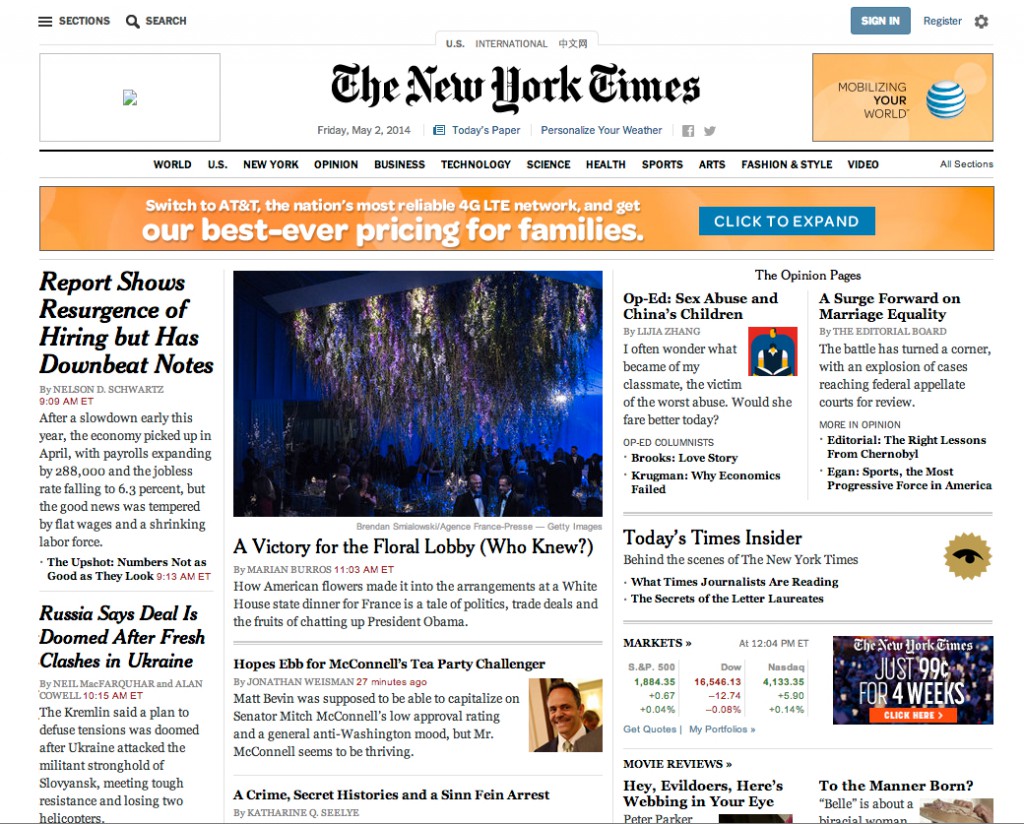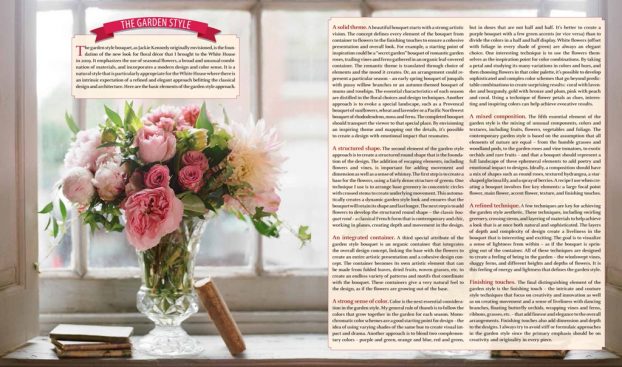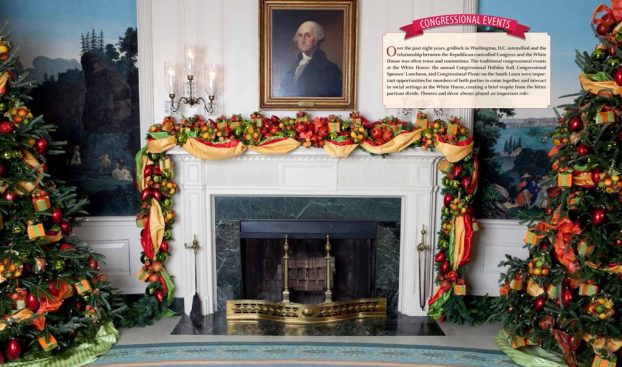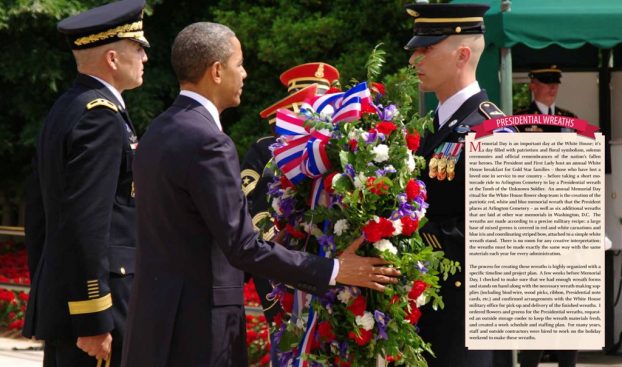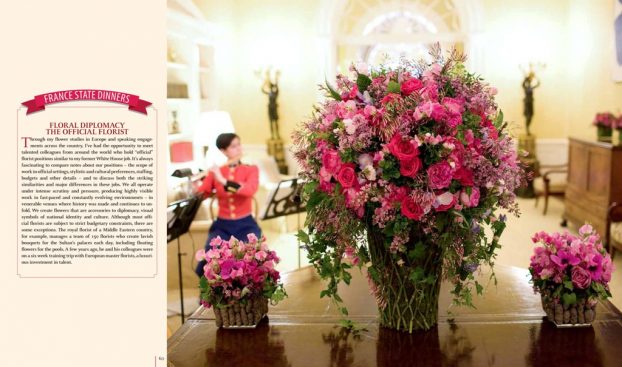Podcast: Play in new window | Download
Subscribe: Apple Podcasts | Podcast Index | RSS | More
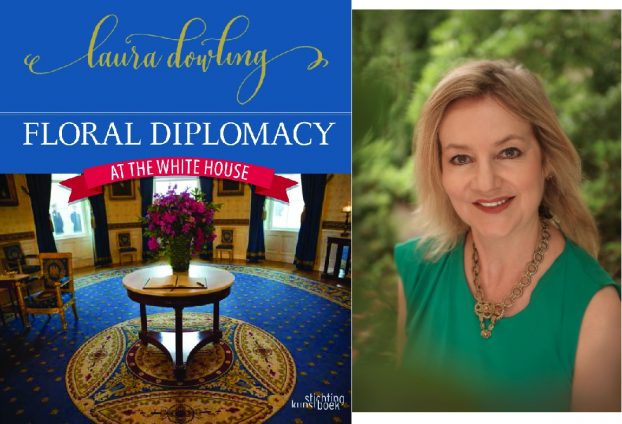
Today’s lovely guest, Laura Dowling, former Chief Floral Designer under President Barack Obama and First Lady Michelle Obama, from 2009-2015
I’m so pleased this week to feature my conversation with Laura Dowling, who served as the White House florist for six years during the Obama Administration. The timing for her appearance here is no coincidence. I’m determined to celebrate beauty, art, culture and human kindness today. It’s a tough week for me and for many of you, I’m sure. By focusing on flowers and on Laura’s unique perspective, not to mention the role she played designing florals for our outgoing POTUS and FLOTUS, their homes and offices, and America’s people, I might just get through the events of this week.
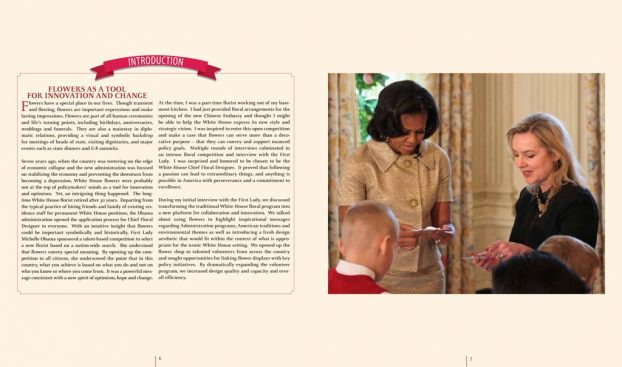
“Flowers as a tool for innovation and change,” a spread depicting Laura Dowling with First Lady Michelle Obama
Laura’s brand new book, Floral Diplomacy at the White House, is published by Stichting Kunstboek, a major European imprint, the 144-page hardcover book has more than 100 photographs, many of which are from the official White House photography taken to document the activities of the Obama Administration — and illustrate how and where Laura’s flowers played a role in our nation’s history. Floral Diplomacy is available for pre-order on Amazon and will be in retail bookstores by early February. Order your copy here.
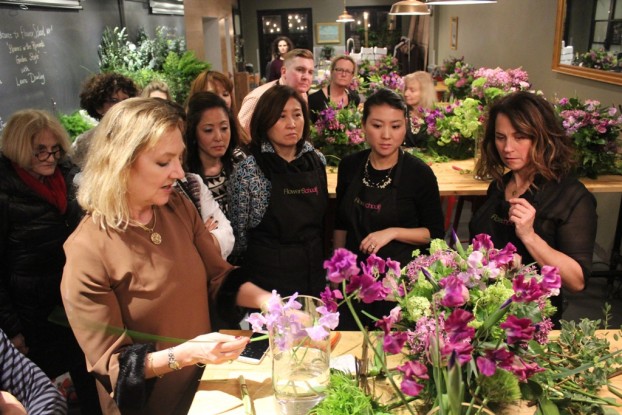
Students at FlowerSchool New York were enthralled by the chance to work directly with Laura Dowling at an early February 2016 workshop.
To introduce Laura, I’d like to share an excerpt from a post I wrote about one year ago. The occasion was inspired by my taking a fabulous 2-hour workshop at FlowerSchool New York in early February 2016, which hosted one of Laura’s first major industry appearances since she left her White House position in March 2015.
I had been eager to meet Laura Dowling ever since I first read about her appointment as White House Florist in 2009. I remember being so enthralled with the New York Times story about Laura’s choices for decorating her first State Dinner (it was the Obama’s first State Dinner, too), for India’s Prime Minister in November of that year.
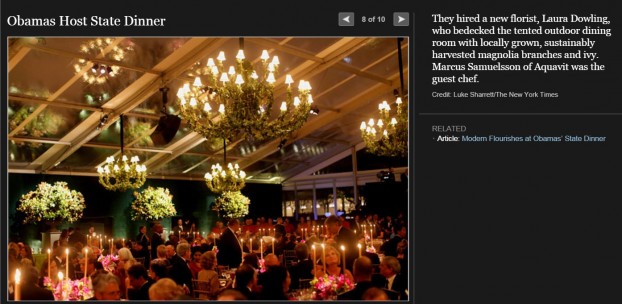 Here’s an excerpt of that report:
Here’s an excerpt of that report:
New York Times (November 25, 2009): “Old Standards with Modern Flourishes as Obamas Host First State Dinner,” by Rachel L. Swarns
” . . . at their first state dinner on Tuesday night, President Obama and his wife, Michelle, made sure to infuse the glittering gala with distinctive touches.
“They hired a new florist, Laura Dowling, who bedecked the tented outdoor dining room with locally grown, sustainably harvested magnolias and ivy.”
Of course, I seized on the language: “locally grown, sustainably harvested,” and ever since I watched closely for signs of Ms. Dowling’s preferences toward the flowers grown near her in Virginia, Maryland, New Jersey, Pennsylvania, and those that may be further away but still from domestic U.S. Farms.
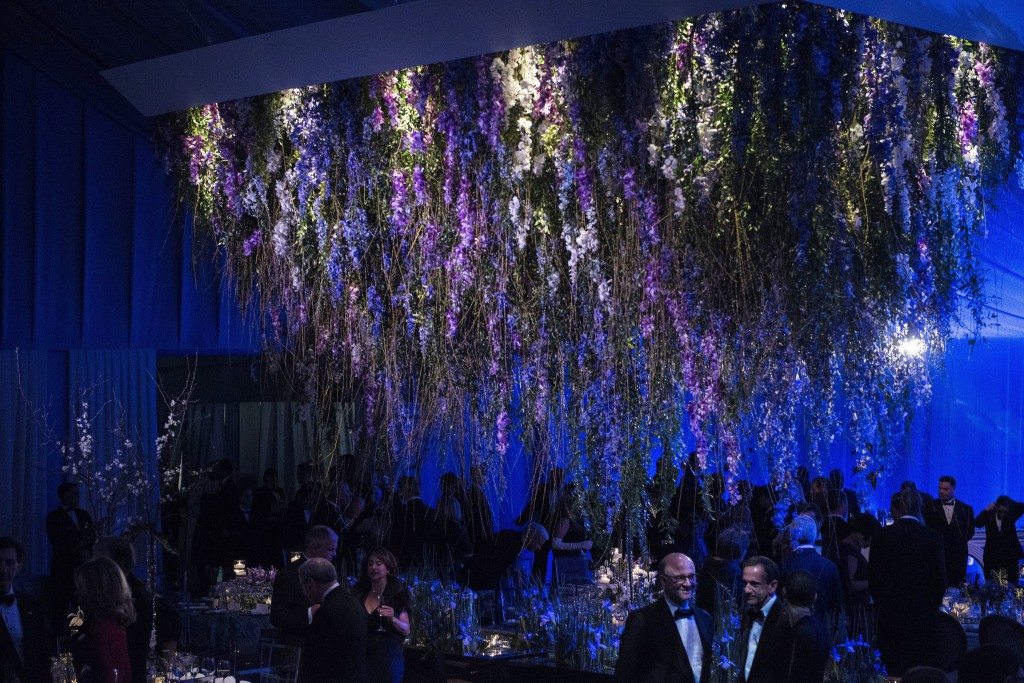
The floral ceiling chandelier — using all American grown floral ingredients — from the White House State Dinner (photo: Brendan Smialowski/Agence France-Presse)
The Slow Flowers Movement enjoyed a subsequent “win” for the cause in February 2014, when the State Dinner for French President Francois Holland yielded the White House’s most public acknowledgement to date about using all-American blooms. There was so much enthusiasm for that public support of American grown flowers that when USDA Deputy Secretary Krysta Harden blogged about the news, it generated more than 150 comments.
After a heady, six-year run as the current administration’s Chief Florist, Laura Dowling returned to civilian life in early 2015 — and she is connecting with the floral design community and American flower farmers more than ever.
In her position as Chief Florist, Laura Dowling planned and implemented decorations for major events at the White House, including the White House Christmas, state dinners, the presidential family quarters, the public tour route displays, and Camp David.
Now, Laura is focusing her creativity on sharing the “Floral Diplomacy” message on both the global and local stage. Her Alexandria, Virginia, studio is a hub of design commissions, several upcoming book projects, and floral styling for photo shoots and more. Her world seems to no longer be dominated by carefully-worded statements and all sorts of other persons’ political agendas, so we’re having a chance to get to know this lovely, gifted and generous floral artist, educator and yes, floral diplomat.
Laura is a Washington State native who grew up in the rural area outside Chehalis, which is halfway between Seattle and Portland in Western Washington. She writes about her connection to this place in, Floral Diplomacy, noting her childhood dominated by the shadow of Mt. St. Helens and Mt. Rainier and the rolling farm country of the Pacific Northwest, saying, “I have no doubt that growing up in such close proximity to the landscape, surrounded by the epic splendor of the Pacific Northwest, gave me a lifelong appreciation of nature, a sensitivity to composition and colors, flowers and the aspiration to create beauty.”
It is that connection to the PNW that brought us together as friends, since Laura and her husband Bob Weinhagen often return to the Pacific Northwest from Washington, D.C., to visit family, including Laura’s mother who still lives in the area where she was raised.
We agreed to meet right before Christmas in the lobby of a downtown Seattle hotel, to speak about Laura’s amazing career and the new book, Floral Diplomacy.
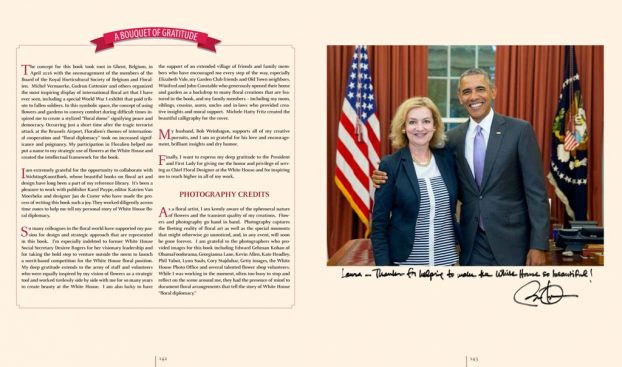 It is an exquisite document of how flowers and floral design played a role in the Obama Administration. In her acknowledgements, Laura writes: “I want to express my deep gratitude to the President and First Lady for giving me the honor and privilege of serving as Chief Floral Designer at the White House and for inspiring me to reach higher in all my work.”
It is an exquisite document of how flowers and floral design played a role in the Obama Administration. In her acknowledgements, Laura writes: “I want to express my deep gratitude to the President and First Lady for giving me the honor and privilege of serving as Chief Floral Designer at the White House and for inspiring me to reach higher in all my work.”
Please enjoy our conversation and learn more about the creative individual who flowered the “People’s House” for six beautiful years.
Find Laura Dowling on Facebook
Follow Laura Dowling on Instagram
Thanks so much for joining me today. I hope you are as inspired as I am about the powerful role flowers can play. Laura broke new ground with the idea that flowers could be more than just decorative placements; she views floral designs as an important strategic tool that can communicate specific diplomatic, symbolic and policy messages.
Returning to the private sector, Laura’s expanded platform now includes event design and consulting, writing and speaking about floral design, and presenting workshops and demonstrations throughout the world. Her goal is to share her unique vision for creating flowers designs in the garden style and to inspire others with her personal story.
Pursuing our passion is what the Slow Flowers Podcast is all about.
It is my hope that when you hear from pioneering voices, thought leaders and creative innovators, not to mention environmental activists and advocates for the Slow Flowers Movement that I feature week in and week out, you, too will be inspired to reach higher in all of your work.
You are not alone. You are part of this community, and as one of our most active members recently reminded me, the way forward is “community over competition” — how true that is. I invite you to share your thoughts in the comment section below.
The Slow Flowers Podcast has been downloaded more than 148,000 times by listeners like you. THANK YOU to each one of you for downloading, listening, commenting and sharing. It means so much. If you value the content you receive each week, I invite you to show your thanks and support the Slow Flowers Podcast with a donation — the button can be found on our home page in the right column. Your contributions will help make it possible to transcribe future episodes of the Podcast.
 Thank you to our lead sponsor for 2017: Certified American Grown Flowers. The Certified American-Grown program and label provide a guarantee for designers and consumers on the source of their flowers. Take pride in your flowers and buy with confidence, ask for Certified American Grown Flowers. To learn more visit americangrownflowers.org.
Thank you to our lead sponsor for 2017: Certified American Grown Flowers. The Certified American-Grown program and label provide a guarantee for designers and consumers on the source of their flowers. Take pride in your flowers and buy with confidence, ask for Certified American Grown Flowers. To learn more visit americangrownflowers.org.
We’re also grateful for support from Arctic Alaska Peonies, a cooperative of 50 family farms in the heart of Alaska providing high quality, American Grown peony flowers during the months of July and August. Visit them today at arcticalaskapeonies.com
More sponsor thanks goes to Syndicate Sales, an American manufacturer of vases and accessories for the professional florist. Look for the American Flag Icon to find Syndicate’s USA-made products and join the Syndicate Stars loyalty program at syndicatesales.com.
A big bouquet of thanks goes to Longfield Gardens… providing home gardeners with high quality flower bulbs and perennials. Their online store offers plants for every region and every season, from tulips and daffodils to dahlias, caladiums and amaryllis. Visit them at lfgardens.com.
And finally, thank you Association of Specialty Cut Flower Growers. Formed in 1988, ASCFG was created to educate, unite, and support commercial cut flower growers. It mission is to help growers produce high-quality floral material, and to foster and promote the local availability of that product. Learn more at ascfg.org
I’m Debra Prinzing, host and producer of the Slow Flowers Podcast. Next week, you’re invited to join me in putting more American grown flowers on the table, one vase at a time. And If you like what you hear, please consider logging onto Itunes and posting a listener review.
The content and opinions expressed here are either mine alone or those of my guests alone, independent of any podcast sponsor or other person, company or organization.
The Slow Flowers Podcast is engineered and edited by Andrew Brenlan. Learn more about his work at shellandtree.com.
Jupiter the Blue; Traveling Made-Up Continents; Instrumental #2 Revisited









